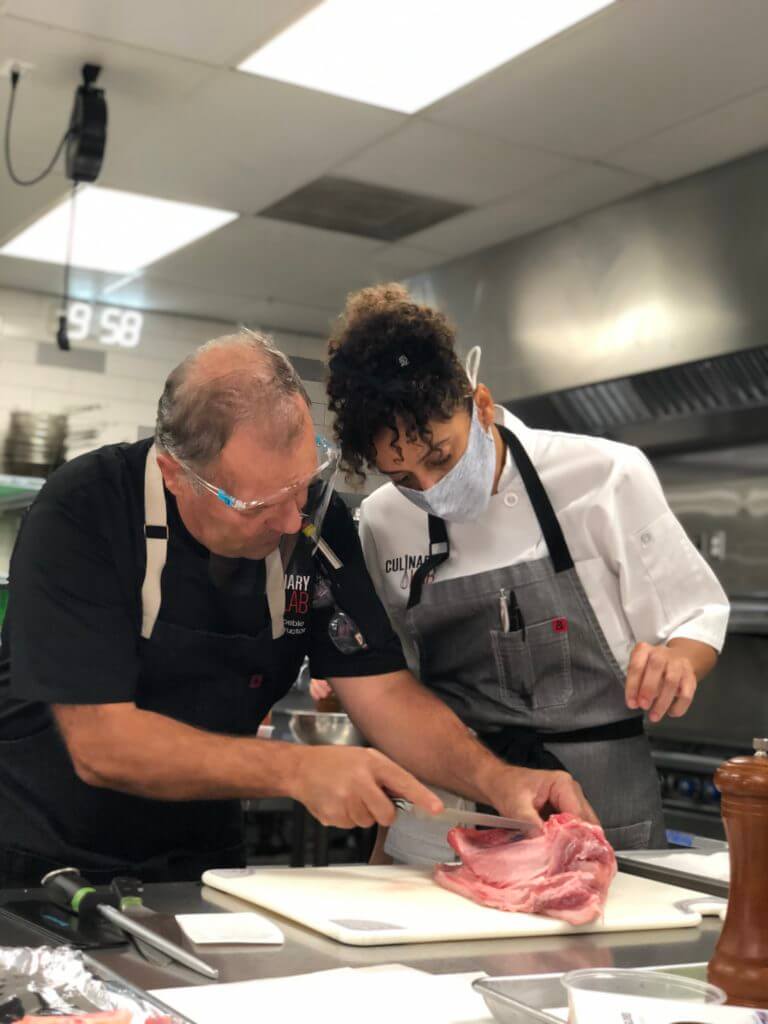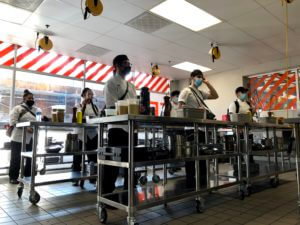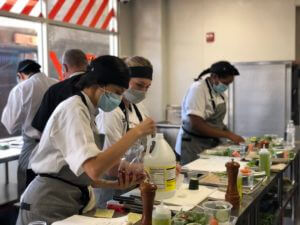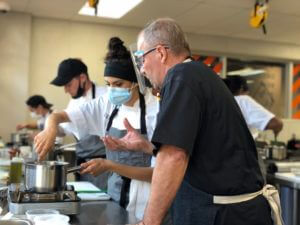What’s the Difference Between a Chef and a Cook?

To simply answer this question, a chef is an individual who is trained to understand flavors, cooking techniques, create recipes from scratch with fresh ingredients, and have a high level of responsibility within a kitchen. A cook is an individual who follows established recipes to prepare food.
While the definition of each role covers the basics, there is a deeper story behind the differences. There is a wide array of differences between a chef and a cook, and we’re taking the time to explain those differences in this article.
Kitchen Hierarchy
To better understand who is a chef and who is a cook, it helps to understand the career path that the two careers will take. Chefs & cooks may perform similar overlapping functions, but the real difference becomes apparent when you step out of the kitchen.
When a cook walks out of the kitchen, he or she is pretty much done for the day. Outside the kitchen, chefs still have to worry about updating their menus and making sure that all administrative tasks like schedules and payroll are taken care of.
Cooks
There are several types of cooks that can be hired into a kitchen. They can be broken down on which part of the kitchen they work in and their experience.
- Stagiaires are “interns” in the kitchen. They are either enrolled in an apprenticeship training program or can be fresh out of culinary school.
- Kitchen Porters are cooks in upper level kitchens. They assist with the basic cooking functions like vegetable preparation and some cleaning duties. They may possess some level of training but not always. They are similar to a prep cook but may have culinary training and are working their way up.
- Junior Cooks/Commis are individuals who work under a line cook to learn how to run a specific section of the line. They may or may not have culinary training.
- Line Cooks are the cooks who run a specific section of “the line” which is a station that prepares a specific type of food. They specialize in that area and it becomes their daily responsibility.
Cooks fill a variety of roles, and will always work under a chef to make the kitchen function. A cook’s overarching responsibility is to help execute the chef’s culinary vision.
Chefs
Chefs can fill many roles within a kitchen from introductory roles to executive level positions. In these roles, a chef may be responsible for a variety of tasks to make the restaurant run.
- Chef de Partie (Station Chefs) run individual stations within a kitchen and prepare the specific dishes and sauces or sides. Some examples of stations include: sauce, butcher, fish, roast, fry, grill, pantry, pastry, vegetable and swing (who gives breaks as needed). A station chef may create recipes based on their speciality and under the direction of the head chef or sous chef.
- Sous Chef is the deputy chef who is the direct supervisor of the kitchen. They are in charge of preparing food, supervising the day-to-day cooking and filling the role of head chef if there is not one present or need to fill in.
- Chef de Cuisine is the head chef. Head chefs are the individuals running the kitchen on the day to day – assuming manager duties, supervising staff, making purchases and working with the restaurant manager to create new menus and recipes.
- Executive Chef is the top chef who manages kitchens based on operations, cost, managing multiple locations, and the business side of the kitchen. They don’t traditionally cook on the day-to-day but they certainly have the ability to in a pinch. Executive chefs have climbed through the ranks for years to earn this position.
Personal chefs are also an option as well. Personal chefs often work in private kitchens alone or in small teams. They must be able to prepare meals of all types and design highly customized menus for their clientele. A personal chef may either cook on location for a client, or create and ship meals to be heated at delivery.
Like a captain of a ship, a chef represents the highest level of the kitchen hierarchy. Chefs are expected to not only understand complex flavor dynamics and how to create the best menu items, but also manage the business side of the kitchen. A chef fills both the supervisor and manager roles within the business, yet may still work intimately with his or her crew to ensure that things run smoothly.


Culinary School and Education
One of the main distinctions between a chef and a cook are their levels or education. This training and education can separate those that enjoy cooking and perform their role daily, and those who are passionate about applying their leadership skills and culinary expertise on a larger scale.
Chef’s Education
A chef is typically educated and often possesses a culinary degree. Chefs undergo classroom-style education and extensive kitchen training in apprenticeships to grasp the concepts and learn from someone with practical experience. This teaches them the ins and outs of the kitchen, makes them well-rounded, and valuable assets to any eatery.
Cook’s Education
A cook position can often be entry level. There isn’t a prerequisite degree or training program, and the specifics of a cook’s role will depend on the individual place of employment. Cooks don’t require the training and background that a chef does as they are often tasked with following recipes rather than creating them or drafting new menus. Cooks can be trained based on where they are working and the types of food they cook.
Chef vs Cook: Experience
In order to become a successful chef you’ll not only need experience, but also the right type of personality. Chefs need to have a persevering attitude, a great work ethic, and the ability to galvanize and lead an entire kitchen staff. The best chefs want to be in the kitchen, learn something daily, and are passionate about constantly improving their dishes.
These behaviors and traits will help you to make the distinction of chef. It is possible to be considered a chef without the culinary school though. It takes many years collecting knowledge and recipes, and experiences that can only be gained of years in the kitchen. A chef can be obtained faster and more efficiently through school, but a cook with experience and the traits of above can also reach this distinction, just with a lot longer time passed.
Cook vs Chef: Salaries
A cook’s salary depends heavily on their level of experience. For chefs that are starting out fresh with no experience, the national average is around $12.18 per hour. This equates to around $23,00 annually. If they have more experience, they can potentially earn up to $15.00 to start and salary would increase over time. While experience, location, and background do play a role, these are the average salaries. Below are some of the average salaries for some of the cook positions discussed:
- Line cook- $13.51 per hour ($39,429 annually)
- Prep Cook- $12.38 per hour ($28,878 annually)
A chef’s salary begins around $15.00 per hour. This is the national average starting out. This comes out to just over $31,000 a year. They can earn significantly more throughout the career and can vary depending on location. The following are average salaries that chefs we have discussed can earn:
• Head Chef- $17.11 per hour ($35,588 annually)
• Sous Chef- $16.08 per hour ($33,446 annually)
• Executive Chef- $28.53 per hour ($59,342 annually)
• Personal Chef- $27.71 per hour ($57,636 annually)
Pros of Being a Chef
There are many benefits to pursuing a career as a chef. The following are some of the amazing opportunities that come with the title.
- Creative Freedom: Cooks are limited to following recipes and lack the training that is required to understand complex flavor profiles. While cooks can make amazing food as well, they don’t have the ability to build new recipes or menus in restaurants.
- Every Day is Different: You’ll never have the same day on repeat. Each day presents new opportunities to learn, practice, and express your creativity on the plate.
- First Dibs on Food: While you’re cooking, you’ll be trying each dish to examine the taste, meaning you’re constantly eating amazing foods prepared by yourself and others in the kitchen around you.
- Always Learning and Training: You’ll have the opportunity to train with many amazing professionals. Once you have evolved in your career, you’ll then be able to share these experiences with other up and coming cooks and chefs.
- You Are Your Own Boss: You’ll have the ability to move to many different roles in the kitchen, manager positions, or even open your own business. Because of the diverse training, you can move laterally anywhere with a kitchen or start your own.
- Team Leadership: You won’t be on your own and get to be a part of an amazing team. Many kitchen teams become close-knit families in which they build a positive environment for you to work and grow in.
- Respect & Authority: Having the title means that you’ll have the respect that comes with it. The title means that you have advanced to the forefront of your field, possess the experience, and the training needed to succeed.


Chef Working Hours
Chefs and cooks often work long hours. Starting out, you’ll feel like you live out of the kitchen. When you get home, you’ll smell like a kitchen. This is a cultural norm for the culinary world, since it takes time and practice to perfect the craft and gain the experiences.
Chefs begin by working 50 to 70 hours per week. This can include early mornings or late evenings, weekends, and holidays. As you work your way up and you’re able to delegate more tasks, you may work less hours and approach a more normal 40-50 hour work week.
With such long hours, you’ll get used to being in the kitchen, develop close bonds with your team, and be able to manifest your passion and creativity onto a plate. At the end of the day, more hours means more practice – so even though the work/life balance can be difficult, your time spent in the kitchen will never be wasted.
Wrapping It Up
Chefs and cooks are both valuable assets to a kitchen staff. They each fill individual roles that can help a kitchen to function smoothly. But, a chef possesses a higher level of experience and education that the role requires. Because of this key difference, chefs earn higher salaries and perform different levels of functions.
Chefs are often higher in the kitchen hierarchy because of the training and it is reflected in their pay. They work long hours to become experts at the craft and excel at using the kitchen as a tool to express their creativity. With that said, all of the hard work leads them to reap benefits that are unique to their field.
Contact Us Today
If you are interested in becoming a chef or simply taking your culinary career to the next level, you’ll need expert guidance, training, and mentoring to teach you the necessary skills. Reach out to one of our culinary professionals today to find out details on enrollment and the various programs we offer.










